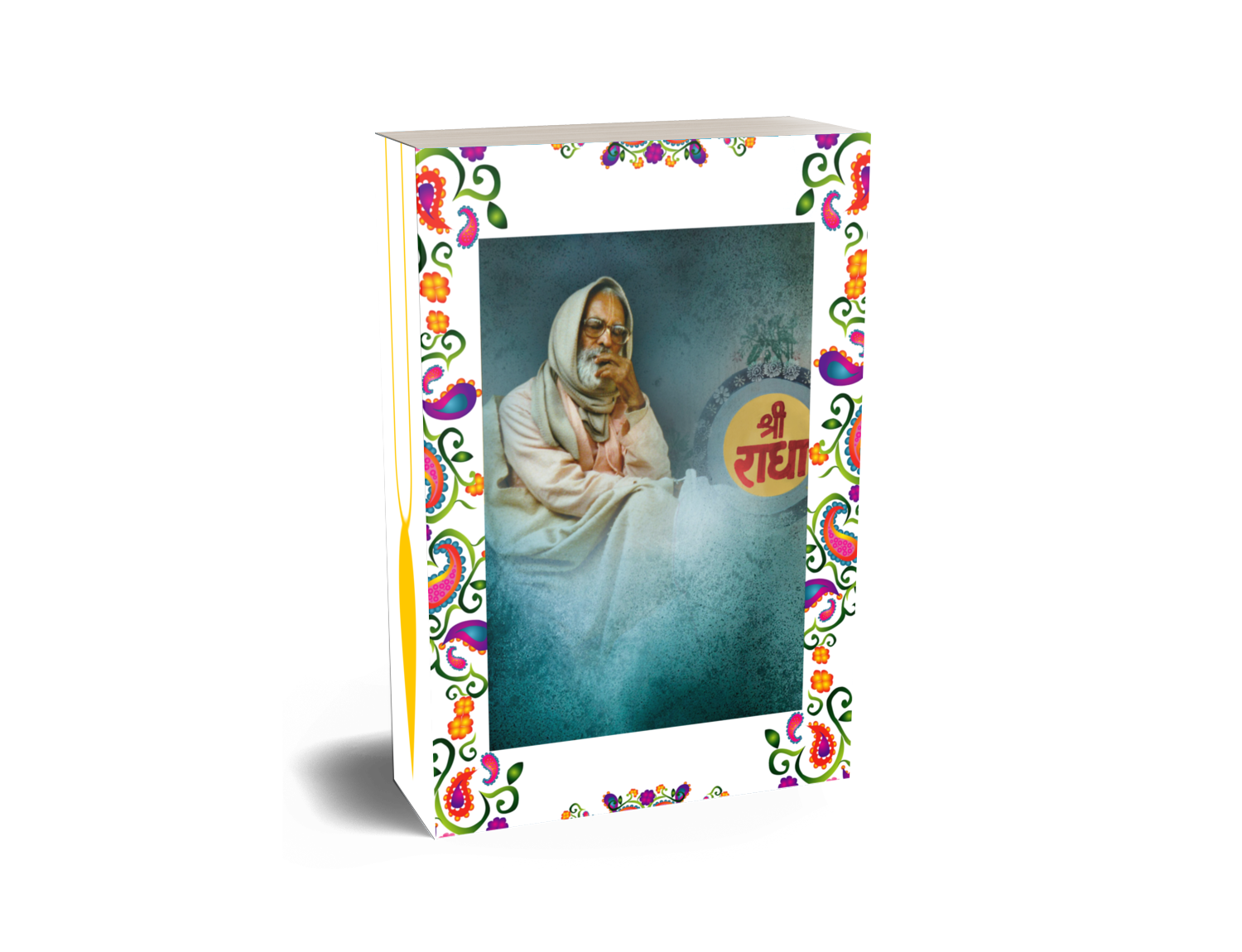

The following is an excerpt from Impressions of Bhakti: Śrī Śrīmad Bhaktivedānta Nārāyaṇa Gosvāmī Mahārāja recalls his early years
I was born in 1921 on the Amāvasyā (dark-moon) night in the month of Māgha (January– February). This is what my parents told me. My father’s name was Paṇḍita Bāleśvarnāth Tivārī and my mother’s name was Śrīmatī Lakṣmī-devī. They were both devotees of the Śrī sampradāya, initiated according to all rules and regulations, and both were expert in devotional music. My father was also an expert in wrestling, singing, and all types of social affairs. He was humble, well-bred, and most importantly, highly religious and conversant with Vaiṣṇava principles.
February). This is what my parents told me. My father’s name was Paṇḍita Bāleśvarnāth Tivārī and my mother’s name was Śrīmatī Lakṣmī-devī. They were both devotees of the Śrī sampradāya, initiated according to all rules and regulations, and both were expert in devotional music. My father was also an expert in wrestling, singing, and all types of social affairs. He was humble, well-bred, and most importantly, highly religious and conversant with Vaiṣṇava principles.
At the time of my birth, my family’s guru (kula-guru) gave me the name Śrīman Nārāyaṇa Tivārī in accordance with the sign of the zodiac. From my birth I was very simple-hearted and innocent. My mother told me, “You would not cry; you would remain seated wherever you were placed. For that reason everyone called you Bholānātha (a name of Lord Śiva meaning ‘god of the innocents’).”
As my parents were very religious, I was also religious, even from my early childhood. To possess bhakti is not merely a result of practice for one birth, but many births. Throughout my childhood I was always chanting, “Rāma, Rāma, Rāma, Rāma, Rāma, Rāma.” Thus my fortune must have been the result of impressions in my heart (saṁskāras) due to taking good association and being of religious temperament in my previous births.
As a child I used to attend religious festivals with my father and hear classes on Śrīmad-Bhāgavatam, Rāmāyaṇa, Mahābhārata, and other scriptures. In the evenings, when my father had finished his family duties, he would sometimes personally recite Tulasī dāsa’s Rāmāyaṇa [Rāma-carita-mānasa] to me, and sometimes Mahābhārata – from beginning to end. At that time many village people would also come and listen to him with faith.
My impressions were such that even in my childhood I would cry for hours whenever I read the Rāmāyaṇa of Tulasī dāsa, and whenever I stopped crying, I would start reading again. I became especially immersed in emotion upon reading about Rāmacandra’s exile, His abandoning Sītā, and Sītā’s entering Pātāla. I became so immersed 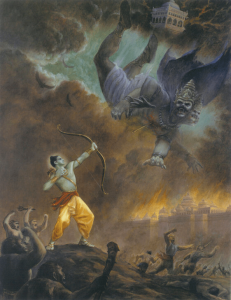 that I used to see the battle between Rāma and Rāvaṇa in my dreams, and I would also see Hanumānjī performing his various services. In one dream, at 4 o’clock in the morning, I saw Rāma, Lakṣmaṇa, Sītā, and Hanumān descending from an aeroplane right before my eyes, their divine effulgence radiating everywhere. But then, when I went to touch their feet, they disappeared. At that time I became so blissful.
that I used to see the battle between Rāma and Rāvaṇa in my dreams, and I would also see Hanumānjī performing his various services. In one dream, at 4 o’clock in the morning, I saw Rāma, Lakṣmaṇa, Sītā, and Hanumān descending from an aeroplane right before my eyes, their divine effulgence radiating everywhere. But then, when I went to touch their feet, they disappeared. At that time I became so blissful.
Throughout my school years, I ranked first or second in my class in academics. In sports, especially in high school, I won first place awards in the one mile and five-mile races, and in the long jump, high jump, cycling races, and boating. No one dared enlist his name for a long race unless he planned to compete for second place, because everyone knew, “Nārāyaṇa will come first.” I also participated in musical programs and debates in Sanskrit.
Once, when I was sixteen or seventeen, my kula-guru gave a series of classes on Śrīmad-Bhāgavatam in our Tivārīpura village. As a great Sanskrit scholar, he would recite every śloka in a melodious voice and then explain its meaning to the crowd of pious listeners that had gathered from the neighbouring villages. On those occasions, I had the opportunity to render personal service to him – decorating the lecture hall, preparing his seat, placing the Bhāgavatam on his lectern, and then listening to his lectures very attentively. My father also contributed greatly to these programs, by organizing the daily ārati of the Bhāgavatam and then distributing prasāda at the end of each program.
The Śrīmad-Bhāgavatam classes were completed after one month, at which time a magnificent yajña was held, followed by a grand feast of the Lord’s mahā-prasāda. My kula-guru showed me much affection for my services, and he left a great impression on my life. In this way I became increasingly immersed in the moods of devotion and gradually acquired a taste for kṛṣṇa-bhakti.
The Mahaviri Jhaṇḍa Festival (in honour of Hanumānjī) once took place on the banks of the Gaṅgā near my village, in Ahalyāvalī – the area where Śrī Rāmacandrajī had liberated Ahalyā from Gautama Ṛṣi’s curse, where Viśvāmitra’s residence was situated, where Rāma and Lakṣmaṇa killed the demoness Tāḍakā, and where Rāma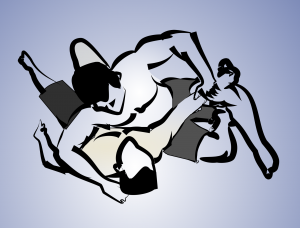 shot His arrows at Mārīca and Subahu in order to protect Viśvāmitra’s yajña. It was a great festival, at which many thousands of people gathered. Various games and wrestling matches were played, which were attended by numerous good sportsmen, and my father also participated as he had versatile talents.
shot His arrows at Mārīca and Subahu in order to protect Viśvāmitra’s yajña. It was a great festival, at which many thousands of people gathered. Various games and wrestling matches were played, which were attended by numerous good sportsmen, and my father also participated as he had versatile talents.
It was at this festival that I heard and saw, for the first time in my life, a nagara-saṅkīrtana with thousands of people dancing and singing, “hare rāma hare rāma, rāma rāma hare hare / hare kṛṣṇa hare kṛṣṇa, kṛṣṇa kṛṣṇa hare hare.” That nagara-saṅkīrtana had a great impact upon me.
When I was in class nine of high school, I received a book that was entitled The Life History and Precepts of Nimbārka Vaiṣṇavācārya as a prize for winning a Sanskrit debate. As I read about the ācārya’s perfect Vaiṣṇava demeanour, his deeds, his attachment for harināma, and his rigorous sādhana, I now began to acquire a real taste for kṛṣṇa-nāma. It was from this book that I learned that all the Lord’s potencies are present in harināma.
I liked history very much, and I used to get top marks in that subject. In one of the history books, I once read a brief description of Śrī Caitanya Mahāprabhu. When I saw His picture, with His long wavy hair, and when I read about His absorption in kīrtana, I was very deeply impressed and influenced.
I was betrothed at the age of sixteen or seventeen, while I was still studying in high school. However, according to Indian custom a wife joins her husband only after the official marriage ceremony, when they are mature. Thus, when I became twenty- one or twenty-two years old, a marriage festival was held for me, and at that time my wife came to live with me. But very soon after that, I left.
[An aside] You can write a little bit regarding the time and place of the marriage, but do not elaborate. [See endnote]
After high school, because I was good at sports, without any effort I was able to get a position in the police 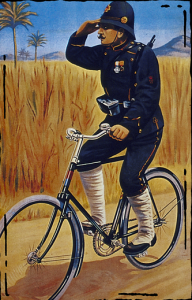 department. The police station was located in the Dumka district of Bihar, at Shahad Gañja, on the banks of the Gaṅgā. All the officers there were happy with me, including the chief superintendent, who was a very religious Bengali.
department. The police station was located in the Dumka district of Bihar, at Shahad Gañja, on the banks of the Gaṅgā. All the officers there were happy with me, including the chief superintendent, who was a very religious Bengali.
About three years after I began my employment at the police station, the chief superintendent was visited by a party of about ten devotees from Śrī Gauḍīya Vedānta Samiti in Navadvīpa. Among them were prapūjyā-caraṇa Śrī Śrīmad Narottamānanda Brahmacārījī, Śrī Śrīmad Bhakti-kuśala Nṛsiṁha Mahārāja, and Śrī Rādhānātha dāsa (who later became pūjyāpāda Bhaktivedānta Trivikrama Mahārāja).
The speaker, pūjyāpāda Narottamānanda Brahmacārījī, narrated the life history and glorified the character of Śrī Prahlāda Mahārāja in the superintendent’s house for seven days. Although at that time I did not know Bengali very well, I would sit through the lectures, and in reciprocation with my faith pūjyāpāda Śrī Narottamānanda Brahmacārījī became very affectionate towards me. After each lecture, he would leave aside all food and drink to sit with me and speak hari-kathā in English throughout the night.
[Śrīla Gurudeva’s servant, Śrīpād Mādhava Mahārāja adds, “Pūjyāpāda Narottamānanda Brahmacārī did not know Hindi and Śrīla Gurudeva did not know Bengali, so they spoke in English.”]
Pūjyāpāda Narottamānanda Brahmacārī was a very learned person, and he was especially a learned scholar in Śrīmad-Bhāgavatam. After listening to his hari-kathā for those seven days and receiving his affection, I became completely renounced at heart. I wanted to leave my government position and go with the devotee party, but I could not get permission because of the chief superintendent’s and everyone else’s affection for me. They would not let me go.
The superintendent asked me, “Why do you want to go? You will soon be promoted.” I immediately thought of an excuse to leave, and replied, “This is true, but I want to start my own business, so there will be no loss in my going.”
When I also told him that in the future I want to do kṛṣṇa-bhajana, he asked, “Do your parents agree to this?” I replied, with the understanding that Gurujī and the Vaiṣṇavas were my actual parents, “Yes, they do.” I then resigned and left that place, but I did not go home. I went directly from there to Śrī Dhāma Navadvīpa to meet my gurujī *.
I arrived at the Navadvīpa-dhāma railway station at twelve midnight, and wondered, “How will I be able to find 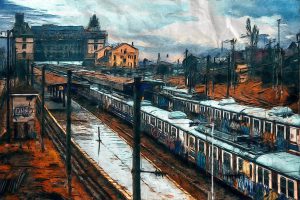 the āśrama in Navadvīpa? I don’t even know the address. Who can I ask at this late hour?”
the āśrama in Navadvīpa? I don’t even know the address. Who can I ask at this late hour?”
I didn’t know how Gurujī knew I would be coming that day, but he knew and Narottamānanda Brahmacārījī also knew; so they had sent pūjyāpāda Vāmana Gosvāmī Mahārāja, lantern in hand and accompanied by another brahmacārī, to find me. The sight of the two of them approaching made me very happy. Together with them I arrived at the maṭha easily, where I saw Narottamānanda Brahmacārījī, my gurujī, and many other Vaiṣṇavas. That day was the eve of Navadvīpa-dhāma parikramā.
The person in charge of the maṭha at that time was Śrī Narahari Ṭhākurajī, a god-brother of my gurujī and an extremely dear disciple of his gurudeva, Śrīla Bhaktisiddhānta Sarasvatī Prabhupāda. Because Śrī Narahari Ṭhākurajī took care of everyone in the maṭha, especially the children, he was affectionately called ‘mother of the maṭha.’ He would chant harināma throughout the day and night, binding his śikhā to a ceiling beam at night so that he would not fall asleep while chanting. Wherever he would go during the day, he continuously chanted harināma. I was a recipient of his abundant love and affection.
Without anyone’s instruction or awareness, I began sweeping the floors in the maṭha, cleaning the cooking pots, and performing a variety of other services. Shortly after Navadvīpa-dhāma parikramā was completed, I received both harināma and dīkṣā initiations.
Gurujī soon became satisfied with my sevā and saw my taste for hari-kathā, and thus he began to keep me with him and engage me in his personal service. I then started to cook for him and wash his clothes, and I listened to his hari-kathā. That I had previously been a police officer was a distant memory. Everything from the past was left behind.
In 1945, just before the beginning of Kārtika parikramā in Vaidyanātha-dhāma**, I went with my gurujī to the Chinchura Gauḍīya Maṭha, where I continued listening to his hari-kathā and doing sevā. It was there that I met prapūjyā-caraṇa Śrīla Bhakti Pramoda Purī Mahārāja, and where gurujī engaged me in personal service to Mahārāja. I began rendering him so many services, such as cooking and giving him water for drinking and bathing.
One of my daily services was to accompany him to the nearby Gaṅgā where he would bathe, and I would bring  my loṭa, my last remaining possession from my previous āśrama. One day, while he and I were in the Gaṅgā, the current took my loṭa. As it floated away I considered, “This is good. Now my last material attachment has gone.”
my loṭa, my last remaining possession from my previous āśrama. One day, while he and I were in the Gaṅgā, the current took my loṭa. As it floated away I considered, “This is good. Now my last material attachment has gone.”
In the following year, I again accompanied Gurujī to the Vaidyanātha-dhāma parikramā. Later, after the parikramā was completed, Gurujī continued to travel and preach. During that preaching tour, Anaṅga-mohana Brahmacārī, who was living and travelling with Gurujī and who would also sing kīrtana for him, fell severely ill with tuberculosis. I was appointed to serve him, at which time I would bring him medicines from a long distance and even clean his body after he passed stool. I took care of him in every respect.
One day, as he sat right next to Gurujī, he began vomiting blood. I went with Gurujī to bring him to a famous homeopathic doctor in Calcutta, and on the doctor’s advice we stayed nearby at Siddhavāḍī. When that and other treatments did not work, Gurujī admitted him to a tuberculosis hospital.
Sometime later, I was at a railway station where I met a cousin from our village who was working as a guard there. When he saw me sitting on the train, he boarded it and embraced me. With great happiness he said, “It’s been so long since you left, and you have not sent us a single message. Where are you residing these days?” I told him my address. I was so simple-hearted that I told him.
Upon leaving me he immediately sent a telegram to my family, soon after which my mother, father, brother, 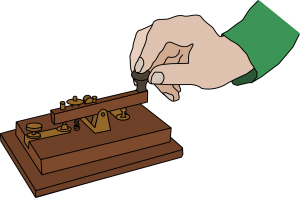 friends, wife, and many important people of the village – a crowd of ten or fifteen – arrived at the maṭha. Then, as my mother wept loudly, they all made a concerted effort to convince me to return to them. Although I was ill at that time, I told them, “Don’t worry. I will come with you.”
friends, wife, and many important people of the village – a crowd of ten or fifteen – arrived at the maṭha. Then, as my mother wept loudly, they all made a concerted effort to convince me to return to them. Although I was ill at that time, I told them, “Don’t worry. I will come with you.”
I offered praṇāma to Gurujī and went with them to the village. Upon my arrival, my mother and all other relatives performed pūjā to Bhagavān in great jubilation, while a band of musicians played on their instruments. Prasāda was distributed, and people from all parts of the village – now extremely happy – came to see me.
The next day, my father invited several prominent scholars, as well as the heads of our village and nearby villages, who were wealthy, highly respected, educated, and knowledgeable. He organized a large meeting, attended by a great number of people, including my school friends who came to see me with curiosity.
They all tried very hard to convince me to live at home and continue to follow religious principles there. Many of them cited examples from the Mahābhārata and the Rāmāyaṇa. Some said that Prahlāda Mahārāja was a gṛhasta and that the Pāṇḍavas, also, performed bhajana-sādhana while living as gṛhastas. All present made the following recommendation to me: “Perform bhajana at home, as they all did.”
“But there is no sādhu-saṅga here,” I replied. “And therefore there is no one to instruct me in such a way that my sādhana- bhajana on the path of bhakti can increase. This is unacceptable to me. I cannot live without sādhu-saṅga.”
Some others retorted, “Then follow brahmacarya, and at the same time remain at home. Be religious, and at  the same time become powerful like your paternal grandfather. Oh, your grandfather was so strong that he would remove bullock carts from the mud. He would untie the bulls and free the carts with his bare hands. When two big buffaloes would fight with the aim to take each other’s lives, he would take a stick in his hand, strike one buffalo on one side and the other on the other side, and cause them both to run in different directions. Become like your grandfather.”
the same time become powerful like your paternal grandfather. Oh, your grandfather was so strong that he would remove bullock carts from the mud. He would untie the bulls and free the carts with his bare hands. When two big buffaloes would fight with the aim to take each other’s lives, he would take a stick in his hand, strike one buffalo on one side and the other on the other side, and cause them both to run in different directions. Become like your grandfather.”
I replied, “The elephant is also strong. But what is the use of strength without bhakti? I do not want to become strong like that. I want to become strong in bhakti.
“Śrīmad-Bhāgavatam (11.9.29) states that without bhakti life is useless:
labdhvā su-durlabham idaṁ bahu-sambhavānte
mānuṣyam artha-dam anityam apīha dhīraḥ
tūrṇaṁ yateta na pated anu-mṛtyu yāvan
niḥśreyasāya viṣayaḥ khalu sarvataḥ syāt
“The human form of life is attained only after numerous births of transmigrating through the millions of species. Although this human body is impermanent, it offers the highest benefit. Therefore, until the body lays down and dies another time, if a man is intelligent, he will wholeheartedly and immediately endeavour to fulfil his mission of life and achieve his greatest welfare. He must avoid sense gratification, which is available even in the animal species.”
Then, my seventy-five-year-old paternal uncle, who was the head of one of the other villages, a very important man, and a great scholar, asked me, “All right then, since you have become a sādhu, can you tell me what is viśiṣṭādvaita-vāda?”
I replied that in order to understand viśiṣṭādvaita-vāda (specialized non-dualism), one must first know about kevalādvaita-vāda (monism) and śuddhādvaita-vāda (purified dualism); not only that, but one must also know about acintya-bhedābheda-tattva (inconceivable difference and oneness). Then, one by one, I began to define kevalādvaita-vāda and all the other theories (vādas). I told my uncle that kevalādvaita- vāda, the teaching of Śaṅkarācārya, is the worship of nirākāra, nirviśeṣa, nirañjana, nirguṇa brahman, the Absolute Truth devoid of form, speciality, qualities, and designations. According to Śrī Rāmānujapāda’s theory of viśiṣṭādvaita, the jīva and the material cosmos are specialities of brahman; although all the energies of the Lord are one, each keeps its individuality (vaiśiṣṭya). Madhvācārya’s conception is called śuddhādvaita- vāda and it stresses on the five eternal differences: the difference between jīva (the eternal living entity) and God, between jīva and jīva, between God and matter, between matter and matter, and between matter and jīva. Then, Śrī Caitanya 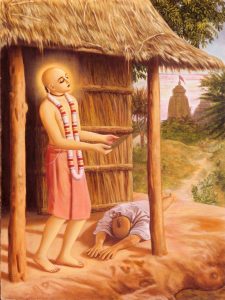 Mahāprabhu’s acintya-bhedābheda-tattva states that the one Supreme Personality of Godhead manifests Himself in many forms, and in this way all diversities are in Him and He is in all diversities although He is different from all of them. Thus, by the transformation of His inconceivable potencies, everything is simultaneously one with and different from Him.
Mahāprabhu’s acintya-bhedābheda-tattva states that the one Supreme Personality of Godhead manifests Himself in many forms, and in this way all diversities are in Him and He is in all diversities although He is different from all of them. Thus, by the transformation of His inconceivable potencies, everything is simultaneously one with and different from Him.
I explained that all the other philosophies are vādas, meaning theories, but the acintya-bhedābheda philosophy, Śrī Caitanya Mahāprabhu’s conception, is tattva, a truth. It combines the ideas of all the other conceptions, and it is marked by the predominance of pure bhakti. I told my uncle and all those present that acintya-bhedābheda is our conception, the conception of our gurujī.
Hearing my explanation, my uncle rose from his seat, embraced me, and said, “You have found a real guru. You have attained sādhu-saṅga. Your renunciation is real and your knowledge of tattva, the established philosophical reality, is complete. From now on, I will not say a word to discourage you.” The meeting ended in this way, and all the people left.
That’s enough for today; later I will tell more. There is no need to elaborate on any events other than those about my life in the line of bhakti. Write about me as I have written about my gurujī. You can follow that example, describing my preaching. You can also discuss how, after coming to the maṭha, I went on so many pilgrimages throughout India. I have written about these in my gurujī’s life history. You only need the dates, the years, the what, and the where. I went to Badrinātha, Dvārakā, and South India two or three times.
* Śrīla Gurudeva had heard about his guru mahārāja from pūjyāpāda Narottamānanda Brahmacārī and had corresponded with him by mail.
** A holy place famous for Lord Śiva’s Jyotir-liṅga Temple in Deogarh (the abode of the gods), in Jhārikhaṇḍa, Bihar.
Endnote
Śrīla Bhaktivedānta Nārāyaṇa Gosvāmī was speaking to Prema-prayojana dāsa, whom he had requested to write his biography. Since that time he has requested other disciples to write it. For example, in a video filmed on November 25, 2003 in Cebu, Philippines, he told his disciple Jayanta dāsa from San Diego, “Write just what I have told. Thousands of classes have been recorded; everything is on record. Afterwards [after my disappearance], you should do as I have done for my gurudeva.”
Image/Art made possible by Pixabay.com & Krishnapath.org








